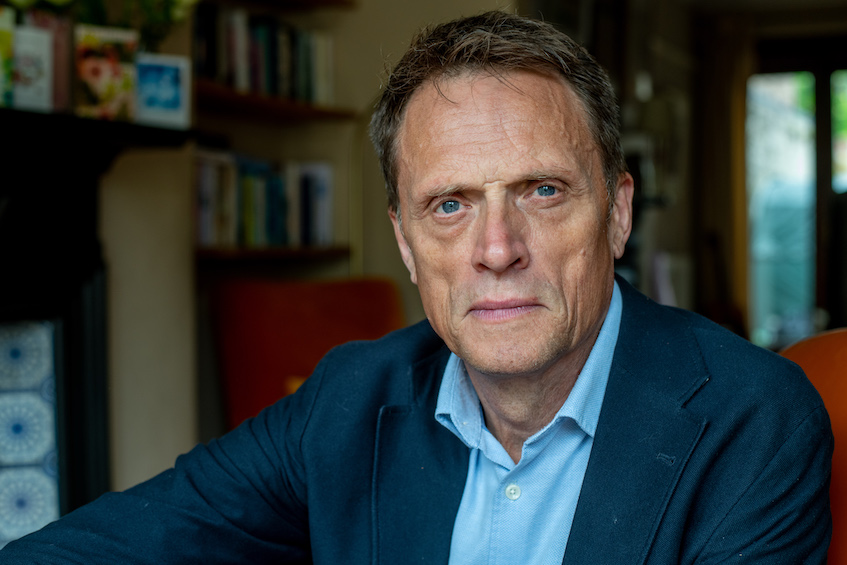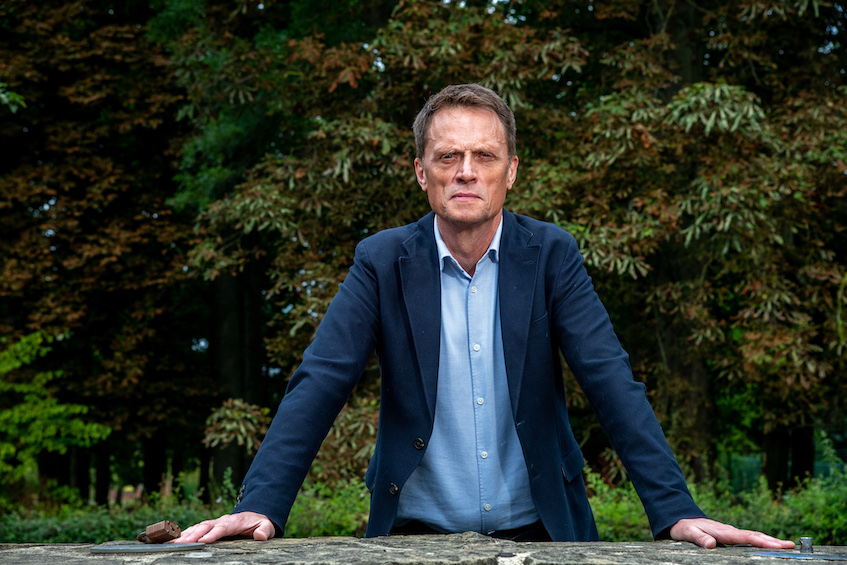A stitch in time…
With evaporating budgets, chronic staff shortages and a huge COVID-related backlog, health and care services face a grim winter, says NHS Confederation chief Matthew Taylor. But with early action on realistic funding, genuine devolution and a proper workforce plan, the new PM can offer some hope to the NHS.

“People feel overwhelmed and demoralised. They’ve been through two years of COVID, and they’re in a situation now where it feels like winter in the middle of August,” says Matthew Taylor. The pressures on the NHS are typically lowest during the summer – but July saw the worst ever figures for both four-hour A&E waits and ‘category one’ ambulance response times. NHS staff, warns Taylor, “look towards the winter that’s coming with trepidation”.
Yet despite this apocalyptic backdrop, Taylor sees glimmers of hope for the NHS. The establishment of Integrated Care Systems (ICSs) to coordinate NHS and care providers’ work at the city-regional level, he says, addresses his long-standing belief that “we’ve got to invest in the spaces between institutions.” Traditionally, he adds, “we invest in bricks; we don’t invest in mortar. We invest in pistons; we don’t invest in oil.” By turning fragmented organisational landscapes into coherent systems, he believes, ICSs “could be really transformative.”
ICSs have huge potential
Taylor has long focused on policy and public service delivery issues: he ran the Number 10 Policy Unit under Tony Blair, and has led both the IPPR think tank and the social issues research body, the RSA. In June 2021, he became chief executive of the NHS Confederation: the membership organisation for NHS bodies in England, Wales and Northern Ireland. “At my age, I wasn’t interested in walking into a system where there was a completely dysfunctional structure and a massive fight taking place,” he comments. But he saw huge potential and widespread support for the emerging ICS model: there was clearly “a broad consensus around this new way of working,” he says.
Over the coming years, he believes, ICSs could help to radically transform care – using personal health monitoring, genetics-driven personalised healthcare and treatment in the home to “provide better, more upstream, more preventative care”. By boosting early intervention and public health, he says, these opportunities “offer the possibility, ultimately, of moving beyond the assumption that health spending always has to grow as a proportion of GDP”.
Balancing this optimism, however, Taylor emphasises that “we are a long way from that. The danger is that unless we are realistic about the pressures we’re under now, and unless we resource the health service properly over the next ten to 20 years, we are not going to get to that future.”
Running hotter than ever
And right now, the NHS is not coping. The UK’s health service has always been “run hot”, Taylor notes: “We have fewer beds and fewer doctors per head of population than many other systems.” Then came a decade of austerity: “There’s a consensus among health economists that spending on health in developed countries with ageing populations needs to go up by around 3.5–4% every year,” he says. “During austerity, the increase was less than 2% a year, and that meant we went into COVID with 100,000 vacancies and a crumbling estate.”
With the pandemic sucking in staff and resources, there were always going to be “major consequences for the care that we were able to provide beyond COVID,” Taylor says. “In particular, it meant growth in the number of people waiting for operations, but also in the number who are ill in the community and whose illness had not been picked up”.
But NHS providers, whose top priorities are restoring early diagnosis and reducing waiting lists, are now being hit by punishing inflation rates. The October 2021 Spending Review envisaged annual increases in the NHS budget of 3.8% in real terms until 2024–25. Then inflation in key fields such as fuel, energy and food hit double digits, while the government announced staff pay rises averaging 4.8%, well above the 3% budgeted. As a consequence, NHS Confed research has found, the NHS faces a real-terms budget cut of between 2.7% and 6.2% this year.
So “the extra money we were promised has evaporated”, Taylor warns, leaving trusts without the funds to realise their goals. And if they have the money, they often lack the staff: vacancies have now reached a record figure of 130,000. The ‘great retirement’ has exacerbated the problem, but today’s exodus is “clearly also driven by exhaustion, by burn-out,” he says. Staff have a “a sense that they’re not able to do the job that they came in to do. I’ve spoken to people in the ambulance service who find it heart-breaking that they’re not able to get to people as quickly as they would want – and that they sometimes get to them too late.”
Economically dysfunctional
Put together, these problems hit providers’ ability to tackle hospital, community and mental health backlogs. That in turn leaves “more people out there in the community who are sick and may end up needing emergency care,” Taylor warns – increasing both the numbers arriving at A&E departments, and the severity of their conditions.
“The acuity of people coming to emergency departments has grown, so more people are coming in with quite complex and multiple challenges,” he explains. And many trusts lack the beds to accommodate them – often because “the lack of funding of social care and the growth in the number of vacancies” means social care services are unable to help patients return to their homes.
“The human tragedy of this is people not getting the treatment they need, and therefore their condition deteriorating,” Taylor comments. What’s more, the situation is “completely economically dysfunctional”: delayed discharges leave people who could be sent home stuck in costly hospital beds, while late diagnoses and treatment often demands more expensive remedies. And there are broader costs, he adds. “The biggest reason for people of working age not being in the labour market is health problems or care demand. When you don’t fund health and care properly, it doesn’t just have a humanitarian impact on people who are sick; it also has a wider impact on our economy.”

“Managers must see their role about being empowering and enabling, rather than controlling and regulating… every part of the system needs to see itself as empowering the level below it.”
Dedicated, hard-working public servants
So how can we begin to restore the quality and capacity of NHS services? Two priorities, Taylor replies, are higher social care salaries and an NHS workforce plan.
He hopes the next health secretary will be strong enough to overcome Treasury resistance to a comprehensive workforce plan, which will set out the money required to squeeze vacancy rates as well as measures to support and develop NHS managers. The NHS has fewer managers than other sectors, Taylor notes: strengthening management would create “greater efficiency and better outcomes”, but we live in an era of “lowest common denominator politics, in which it feels easier to say the reason the health service faces problems is because there are too many bureaucrats and managers, rather than recognising the really big issues and challenges that I’ve described.”
The idea that “doctors and nurses are under immense pressure and we love them, but managers live in the lap of luxury and all they do is shuffle papers around is so far from the truth,” Taylor comments: these are dedicated, hard-working public servants, and politicians should “resist the temptation to say something which might be crowd-pleasing, but is wrong and very unhelpful.”
Such criticisms aren’t just unfair, he says, they also deter talented managers from taking jobs at the trusts most in need of better leadership. “We don’t want a situation where people feel it’s career-threatening to take on a tough job,” he warns.
Empowering and enabling
Taylor also calls for more spending on management training. The health service has too often “underestimated the investment we should make in leadership and organisational development,” he says – citing the failure to adequately support the GP teams developing primary care networks. For ICSs to transform how health and care providers interact, we’ll need to develop “leaders that can work in highly collaborative settings” where “in order to get impact, you have got to influence things which you don’t control.” Managers, he adds, must “see their role as being about empowering and enabling, rather than controlling and regulating”.
Indeed, he says, “every part of the system needs to see itself as empowering the level below it. So the centre needs to see its role as empowering and enabling systems; systems need to see their role as empowering and enabling organisations; and organisations need to see their role as empowering and enabling staff.”
In some cases, Taylor comments, decision-making may move up from organisational to ICS level: in selecting capital investments, for example, ICSs are well placed to understand “where that investment is going to achieve the biggest bang for buck”. But the greatest mindset shift required is for the Department of Health and Social Care and NHS England to “recognise that they’ve created these new structures, and they’ve now got to devolve.
“As far as possible, we need to give ICSs objectives in terms of outcomes, but allow ICSs and places to go about how they achieve change in their own way,” Taylor continues. ICSs must not become another “layer in a hierarchical bureaucracy”; acting as if they’re “merely delivery vehicles for the centre would be completely counterproductive”. Instead, national bodies should assist ICSs to realise their own plans, clearing the obstacles in their way. Similarly, he argues, ICSs need to be saying to providers, “We can bring expertise; we can remove barriers, we can engage the centre. Tell us how we can help!”
Given the NHS’s history of frequent, top-down reforms, the centre must also give ICSs sufficient time to develop and implement reform plans. “It would be defying gravity to say that ICSs will still be there in 30 years’ time. But we need to give ICSs enough time to make a difference,” he says.
Realism reset
Asked how the new prime minister can ensure that ICSs realise their potential, Taylor is clear: “Realistic funding, and a more decentralised NHS. If funding is inadequate – if the capacity gap is allowed to continue – it doesn’t matter what system you’ve got in place”, he says, NHS bodies will never be able to meet the public’s expectations.
“On the other hand, there’s no point creating new structures where health services work closely with local government and the voluntary sector, if health leaders go to meetings and say: ‘I’ve got no latitude to do things differently, because all I can do is what I’m told by the centre’.”
Observing the Tory leadership election – still in progress at the time of our interview – Taylor sees little ground for optimism. “We’ve been calling for months for a realism reset, and I’m afraid I don’t see much sign of it in the Conservative Party leadership hustings,” he says. He hopes the new prime minister will show “greater realism” when they have to respond “not just to the Conservative Party membership but to the whole country”.
Meanwhile, the NHS faces a perilous winter. Even if we experience a mild flu outbreak, avoid harmful new COVID variants and ameliorate the cost of living crisis, warns Taylor, NHS and care providers will come under huge pressure. “If, however, you take the challenges that we’ve got now and you add in flu and COVID and a worsening cost of living crisis,” he concludes, “it’s going to be very, very tough.”
Related News
-

“Showing kindness and trust creates a virtuous circle – people respond well to that”
As chief executive of Suffolk and North East Essex, one of England’s most highly rated integrated care boards, Ed Garratt has pioneered a radically different approach to leadership – one based around kindness, trust and putting down deep roots in local communities. He talks to Healthcare Manager’s Matt Ross.
-

We need to give managers reasons to join the profession — not risks to avoid
Steve McManus’s work developing the leaders and managers the NHS needs for the 21st century has caught the eye of national leaders. The Royal Berkshire trust chief executive talks to Matt Ross about transforming services, developing leaders and the right way to regulate the management profession.
-

Interview: Dr Phil Hammond, doctor, comedian, health campaigner
Doctor, comedian, broadcaster, writer, health campaigner and politician manqué, Dr Phil Hammond is now drawing up a manifesto to rescue the NHS and boost the nation’s health. On the eve of a watershed general election for the UK, he spoke to Healthcare Manager’s Matt Ross.